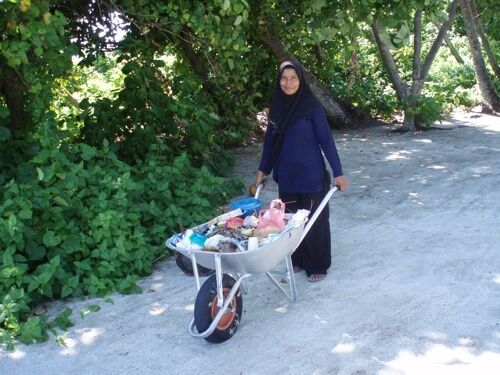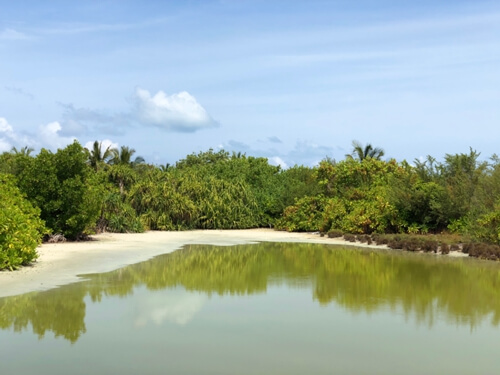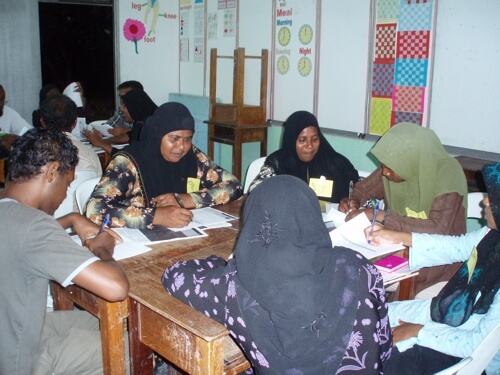
Who We Are
Our Identity
Live and Learn Environmental Education (Live & Learn) is a network of locally registered non-governmental organizations operating in 9 countries. Live & Learn office based in Melbourne provides strategic and technical support across all countries and ensures effectiveness and transparency. Local knowledge and global understanding are the starting points in developing an ethic in environmental and development education. Local ownership of environmental and development education programs, open participation and equality remain the foundation of LLEE.

- encourage networks and partnerships between schools, children, youth, teachers, governments, chiefs, elders, parents, the media and non-governmental organizations (NGOs)
- promote the integration of the concepts of human rights, environmentalism, humanitarianism, culture, gender equality and peace in all projects and programs
- promote action-based, effective and creative learning models and teaching methodologies
Live & Learn works across 9 countries in the Asia‐Pacific region and has more than 20 years’ experience in community development in the Asia‐Pacific. This experience and knowledge about the many challenges facing small islands countries will contribute towards producing high quality outputs. Countries of experience include: The Maldives, Fiji Islands, Solomon Islands, Vanuatu, Cook Islands, Papua New Guinea, and Cambodia. Where the focus of our work is with communities, we are often called on to provide advice on government policy and strategy development. During the past decade Live & Learn has implemented more than 40 projects and has, through these projects, developed new thinking and practice in participatory community action and mobilization. More importantly we have demonstrated experience in achieving changes in knowledge, attitudes and practice and then linking this practice into national legislative framework and policy.

Our Vision
Live & learns vision is for a sustainable and equitable world free from poverty.
& Mission
Live & Learn educates, mobilizes communities, and facilitates supportive partnerships in order to foster a greater understanding of sustainability, and to help move towards a sustainable future.
Live & Learn Maldives
Live & Learn in the Maldives is a locally registered organization and has been working in the Maldives since 2005. Live & Learn has implemented a series of small to large-scale projects in the Maldives on environmental management and resilience building, education and mobilization, gender and empowerment of women, livelihoods and sustainable development and capacity building and training. Most of our work has been funded by the Asian development Bank, World Bank, United Nations Children’s Fund, International Women’s Development Agency and some local cooperate funding partners.


Live & Learn Maldives is governed by a Board of Trustees that consisting of FIVE members. The board meets annually for planning meetings and to accept the annual independent audit. Live & Learn staff and consultants are guided by our ‘Best Practices Manual’ which outlines procedures in areas of (a) financial management and accounting (b) equipment and vehicle use (c) travel policies (d) salary structures (e) staff leave entitlements (f) anti‐discrimination (g) occupational health and safety (h) performance management and career development (i) recruitment guidelines.
Live and Learn has played a significant role in partnership with Government and non-governmental stakeholders to overcome the barriers to improve waste management in the Maldives by designing and implementing several waste education and awareness programs. Some of the products and tools developed previously will be used to raining programs developed to mobilize communities and youth for community environmental “action”.
Live & Learn already has impressive achievements. Its innovative approach to projects and its impressive record in delivering quality outcomes within budget and in agreed timeframes has gained us considerable recognition.
Live & Learn’s focus is environmental and development education in both schools and the community; We link this work through to the broader development goals of peace, economic development, and sustainable communities. Working in environmental education enables us to work on these broader development goals in a way that is meaningful to teachers, students and the broader community. It provides a practical way of anchoring our work in the everyday life and concerns of project participants.

Development Principles
Our development philosophy is key to the success and sustainability of our work. We believe that the processes that lead to change are as important as the change itself. These processes can be captured and tested in different contexts. Their strength is their ability to be replicated, and their positive motivational effect on communities.
Four key development principles underpin our work. These principles have been developed through practice and thousands of hours spent in communities by our staff.
Key Development Principles
1. Developing education approaches based on community reality and perceptions
In order to create change, people from outside a community will invariably arrive with new ideas, often coming from a different culture, with different sets of values, beliefs and perceptions. However, it is important to remember that many communities do not perceive poverty or sustainable development in the same way we do.
There are many perceptions of environmental problems, their causes and solutions, and that the perception held by Live & Learn, both philosophically and practically, may not necessarily be in agreement with that of the community. Live & Learn seeks to understand the perceptions of the community, and to start the development of educational interventions from where the community is at, rather than from our own perspective. Live & Learn encourages communities and individuals to explore and share experiences, ideas and opinions, and to question and clarify environmental problems, their root causes and their links to wellbeing.
2. Taking an integrated approach while being focused
Social and economic processes affect environmental sustainability. Therefore, to have a meaningful impact, environmental education should be delivered through a human paradigm. Through this paradigm, biology and environmental science take second place to the human issues of governance, human rights, health, livelihoods, gender and participatory processes.
The process of integrating environmental, social and economic issues through practice is complex. It is easy to lose focus, and the interest of the community, as people have urgent needs to pursue. To demonstrate integration at community level it is critical to have strong entry issues that communities can relate to. These issues are often brought back to three key areas of environmental education: society, environment and economic opportunity, with culture as an underlying dimension.
Often, developing countries face unique challenges in sustainability development. Specifically; safeguarding water resources, accessing sanitation and hygiene, sustaining tourism and fishing benefits, dealing with illegal logging, decentralising governance, strengthening health services in remote areas, strengthening community organisation, waste reduction, climate change adaptation, and so on. Only by taking an integrated approach in meeting these challenges can we shape meaningful strategies and solutions.
3. Issues of participation and partnerships
The wellbeing of communities must be at the centre of all policies and strategies. Environmental management has an immense capacity to both limit and advance human development and this effect is influenced by social and economic processes, which in turn are guided by governance and decision-making. Governance is often perceived to be government, but governance starts at the community level. In the context of environmental management in developing countries, opportunities to develop sustainable, innovative and community-driven environmental management solutions, are greatest if managed and governed by those closest to the environmental source. Community ownership and participation in developing these solutions are key to sustaining impact. For this to be achieved, a community’s capacity and structure need to be established. How communities are engaged and are participating is important.
Everyone is a stakeholder in environmental education. All of us will feel the impact of its relative success or failure and all of us affect the impact of it by our behaviour, be it supportive or undermining. This generalisation does not, however, help to identify targeted strategies of cooperation, communication or action. Particular roles and responsibilities devolve to a number of bodies and groups at different levels: local (sub-national), national, regional and international. At each level, stakeholders may be part of government (or intergovernmental at regional and international levels), civil society, non-governmental organisations, or in the private sector. The functions and roles of these categories, at each level, are complementary.
Special mention must be made of indigenous peoples, because of their particular and long-term links to specific biophysical environments and because of threats to their livelihoods, present and future. They represent a fund of knowledge in balancing the use and preservation of natural environments. The intimate knowledge and sustained use of their environment gives indigenous people a role in informing the wider debate and offering detailed insights into practices of the “management” of human survival.
4. Making evaluation meaningful to communities
The purpose of evaluation is multi-faceted. In part, it is used by the implementing organisation and funding agency to assess the benefits and impact of the work carried out. However, the evaluation should also benefit the communities in which the work is being carried out. Too often communities never see such data and therefore have no opportunity to use the data to further improve practice and capacity. People from outside the community, who do not “live” the many challenges experienced by the people within the communities themselves, often impact evaluations. With some guidance, communities are well placed to evaluate impact, as they experience any changes first-hand. Leading community participation is key to meaningful evaluation. One effective method used by Live & Learn is the Most Significant Change (MSC) technique. It is a form of participatory monitoring and evaluation in which stories of change are collected from the community. The process involves the collection of significant change stories from the field or classroom and the systematic selection of the most significant stories by project stakeholders and partners. Project stakeholders then discuss the value of the stories; how successes can be replicated, and how to identify limitations and opportunities.
Ongoing Projects
Stories
Work with Us
